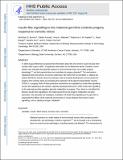Insulin-like signalling to the maternal germline controls progeny response to osmotic stress
Author(s)
Furuta, Tokiko; Webster, Amy K.; Baugh, L. Ryan; Arur, Swathi; Burton, Nicholas O; Kaplan, Rebecca D.; Horvitz, Howard Robert; ... Show more Show less
Downloadnihms842722.pdf (1.149Mb)
PUBLISHER_POLICY
Publisher Policy
Article is made available in accordance with the publisher's policy and may be subject to US copyright law. Please refer to the publisher's site for terms of use.
Terms of use
Metadata
Show full item recordAbstract
In 1893 August Weismann proposed that information about the environment could not pass from somatic cells to germ cells, a hypothesis now known as the Weismann barrier. However, recent studies have indicated that parental exposure to environmental stress can modify progeny physiology and that parental stress can contribute to progeny disorders. The mechanisms regulating these phenomena are poorly understood. We report that the nematode Caenorhabditis elegans can protect itself from osmotic stress by entering a state of arrested development and can protect its progeny from osmotic stress by increasing the expression of the glycerol biosynthetic enzyme GPDH-2 in progeny. Both of these protective mechanisms are regulated by insulin-like signalling: insulin-like signalling to the intestine regulates developmental arrest, while insulin-like signalling to the maternal germline regulates glycerol metabolism in progeny. Thus, there is a heritable link between insulin-like signalling to the maternal germline and progeny metabolism and gene expression. We speculate that analogous modulation of insulin-like signalling to the germline is responsible for effects of the maternal environment on human diseases that involve insulin signalling, such as obesity and type-2 diabetes.
Date issued
2001-02Department
Massachusetts Institute of Technology. Department of Biology; Massachusetts Institute of Technology. Department of Brain and Cognitive Sciences; McGovern Institute for Brain Research at MITJournal
Nature Cell Biology
Publisher
Springer Nature
Citation
Burton, Nicholas O., Tokiko Furuta, Amy K. Webster, Rebecca E. W. Kaplan, L. Ryan Baugh, Swathi Arur, and H. Robert Horvitz. “Insulin-Like Signalling to the Maternal Germline Controls Progeny Response to Osmotic Stress.” Nature Cell Biology 19, no. 3 (February 6, 2017): 252–257.
Version: Author's final manuscript
ISSN
1465-7392
1476-4679